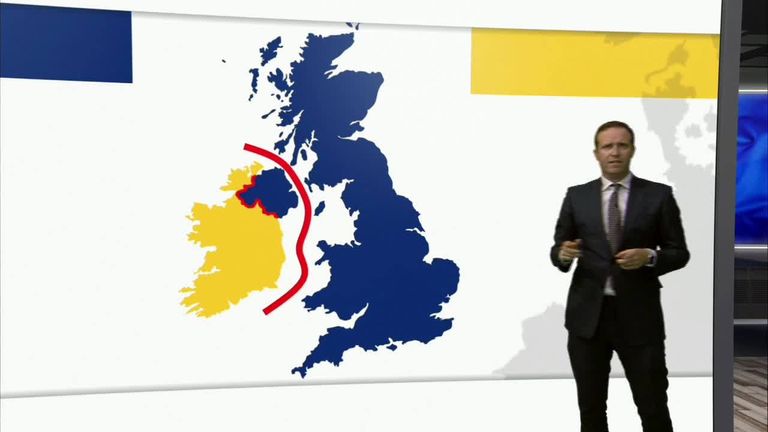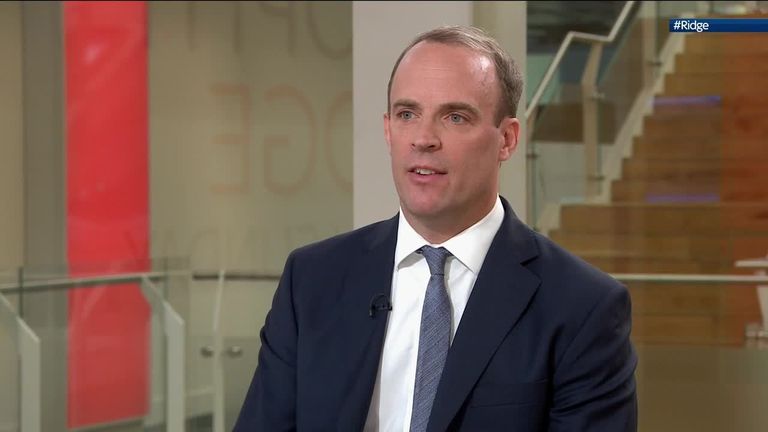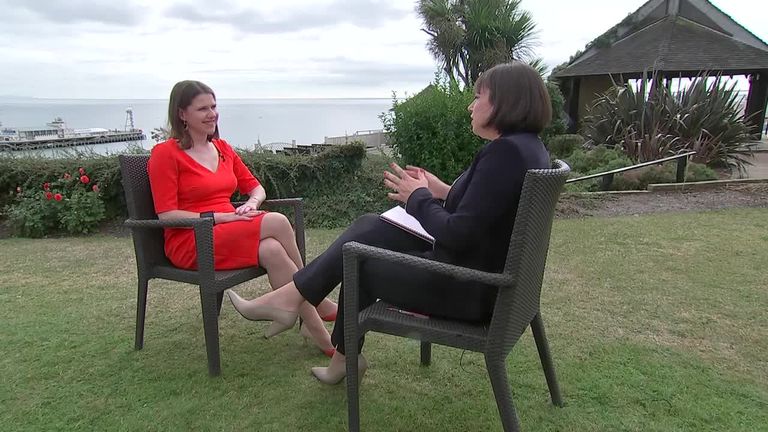Brexit countdown: What happens next and why you need to know
Saturday 5 October 2019 10:20, UK
Boris Johnson has published his new Brexit proposal to the the European Union in which the controversial Irish backstop has been removed.
The prime minister has said he wants a deal in place ahead of the EU summit on 17 October so the UK can leave the bloc with an agreement at the end of the month.
We'll take you through what's likely to happen next.
Parliament prorogued... again
Boris Johnson will seek to suspend parliament for a week from 8 October until the Queen's Speech on 14 October.
Last week, the Supreme Court ruled that a previous five-week suspension - or prorogation - of parliament requested by the prime minister was unlawful.
In fact, the 11 judges declared that "parliament is not prorogued", meaning MPs and peers could go back to Westminster - and they did, almost immediately after the judgment was delivered.
If Mr Johnson's request to suspend parliament from next Tuesday evening is accepted by the Queen then MPs will have a week out of the Commons before the prime minister's plans for his government are set out in the Queen's Speech on 14 October.
It is the same date MPs were meant to return after the initial prorogation, before it was ruled unlawful.
EU summit
Intense negotiations between the government and Brussels are expected to get under way between now and the crunch EU summit in Brussels on 17-18 October now Mr Johnson has revealed his Brexit blueprint.
The PM has sold his plan as a "fair and reasonable compromise". The proposal would keep Northern Ireland tied to the EU single market rules for trade in goods - but leave the customs union with the rest of the UK, resulting in new customs checks.
So far European leaders' response to the PM's proposals to resolve the issue of the backstop has been lukewarm.
Irish PM Leo Varadkar said the proposals "do not fully meet the agreed objectives" of the backstop, while European Commission President Jean-Claude Juncker said there were some "problematic points".
If the reaction to Mr Johnson's offer remains flat, the chances of a new agreement being reached with the EU are slim.
Does that mean Brexit is definitely on?
In principle, yes.
The Brexit date remains 31 October and Mr Johnson has said he won't be delaying the UK's exit from the EU by asking for another extension.
But the Benn Act - the legislation rushed through parliament in September after MPs took control of the Commons agenda - requires the PM to seek a delay to Brexit if MPs have not approved a deal, or agreed to leave the EU without one, by 19 October.
The government hasn't actually said how it plans to get around the law forcing him to ask Brussels to delay Brexit if he hasn't succeeded in getting a new deal.
So this question still hangs in the balance.
Will the PM have to break the law to force a no-deal Brexit?
Well, the government says very clearly it will never break the law.
But it is planning to "test" it to its limit and see if it can find any wiggle room to avoid delaying Brexit again.
If it all comes down to a matter of interpretation, this will probably end up in the courts.
Will there be a vote of no confidence in the PM?
Opposition parties can call a vote of no confidence in the government at any point.
But they have so far flatly refused to do so - despite challenges from Mr Johnson for them to throw down the gauntlet.
Labour leader Jeremy Corbyn has said he and other opposition leaders remain committed to preventing a no-deal Brexit - first and foremost.
Mr Corbyn has said a motion of no confidence will be tabled at a point when it can be carried in parliament, but opposition parties' priority has been to make sure the PM takes no-deal off the table, obeys the Benn Act and applies to the EU for an extension if an agreement cannot be reached.
So… is the election completely off now?
For now, yes.
Opposition parties have been blocking the prime minister from calling an election because they want to be sure their efforts to delay the Brexit Halloween deadline to avoid no-deal actually pay off.
When we find out if they definitely have on 19 October, then they may back a poll soon after that.
The earliest date it could now be - assuming convention is followed and it is held on a Thursday - is 21 November.
Cancel Brexit?
There is also the legal option of cancelling Brexit by revoking Article 50.
The Liberal Democrats have backed party leader Jo Swinson's call to campaign at the next general election with a promise to revoke Article 50 and cancel Brexit if they form a majority government.
The party had previously supported staying in the EU, but via a majority vote for Remain at a second referendum.














